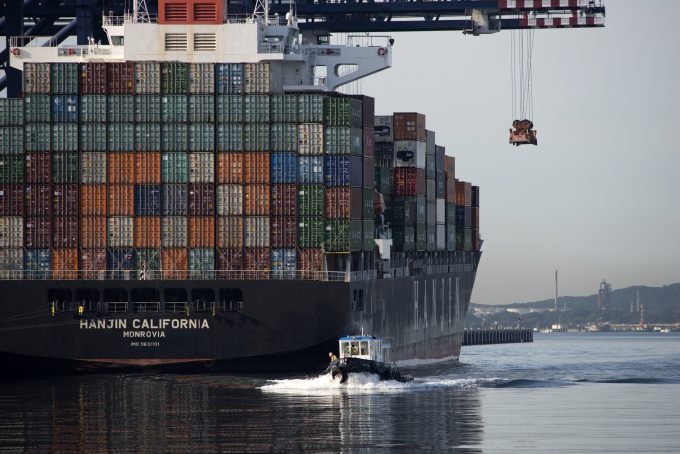Samsung takes action over thousands of 'unlawful' D&D charges by Cosco and OOCL
Samsung Electronics America (SEA) has filed two complaints with the US FMC over “excessive and ...

The air freight industry appears to have missed a boost to business from the collapse of container line Hanjin, after a US court ruled that the line’s ships could dock under provisional bankruptcy protection.
However, with many ships stuck outside ports the world over, it would seem likely that manufacturers in some regions, unable to access their shipments, will need to charter aircraft to replace the goods.
Samsung yesterday appealed to the US court to allow two ships waiting to dock off Long Beach, into the port.
The hi-tech company has 304 containers of parts and finished goods for its visual display business, valued at $24.3m, on the two ships, while a further 312 containers held finished goods from its home appliances division, valued at approximately $13.4m.
Samsung explained that if the ships were not allowed to dock, it would need to charter at least 16 air freighters, at a cost of $8.8m, to move 1,469 tons of alternative goods.
The filing noted: “If the vessels cannot dock at Long Beach, the finished goods cannot be delivered to Samsung’s retailer customers in the US. Moreover, parts in these containers cannot be transported to Samsung’s factory in Mexico, where they are assembled into finished products such as televisions.
“Without those parts, the finished goods cannot be assembled and supplied in time to Samsung’s retail customers and ultimately to US consumers.”
Hewlett-Packard filed a similar application for access to 142 containers.
With Black Friday ahead, and the related peak season, Hanjin’s demise has come at a particularly bad time for shippers, as vessels are stuck outside ports.
Hanjin, according to local media, would need to pay $543m in fees to offload containers on its ships. It has pledged to spend $90m, which includes $36m from the personal assets of its chairman.
The court motion for provisional relief was contested by TTI, a joint-venture owned by Hanjin Shipping Co and Terminal Investment, which operates two marine terminals in the US (Long Beach and Seattle) and provides services to Hanjin and other lines.
TTI filed its own motion alleging that the “lack of a short-term plan for these vessels will lead to mayhem. The vessels will have no means to berth (as the tugs and tug operators will not service them) and no ability to unload (as the unions and port operators will not serve them). And even if these tasks are somehow accomplished, Hanjin must provide fuel and supplies for its ships, but they do not appear to be able to pay these bills”.
It added: “The result could be that the vessels remain at TTI’s berths indefinitely without the ability to depart, leaving TTI with no ability to free-up these berths. This would be disastrous for Hanjin and TTI.”
TTI advised that Hanjin should meet with its US creditors and reach a short-term plan.
“Whether intentional or not, the effect of Hanjin’s request may also be to require TTI to continue to provide costly direct post-petition services for which it will never be paid, and, if Hanjin has not fulfilled its obligations to local unions, tugs, fuel companies and others, leave TTI with Hanjin’s stranded vessels at its berths, putting TTI’s business itself at tremendous risk.”
The judge, however, decided it was in the best interests of the debtor, creditors and “the public and public policy of the US” to allow ships to dock in the meantime. Objections are to be filed by 5pm tomorrow.
Comment on this article
HB
September 07, 2016 at 1:28 pmThe irony; Samsung squeezed carriers and so it obtained (loss making for carrier) rates. And then now this.